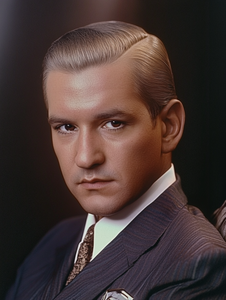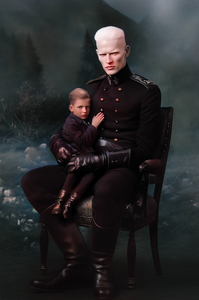Bernhard Sturm

Bernhard Sturm (7596 - 7677) was born in the Blumenstad urbanate in the Transelfasland Commonhold and was born a Stolvic Orderist Commonwealth (SOC) citizen. When he was two, the Wolgos Scourge broke out, and by the time he turned three, he had already been a couple of months at the Alchemkros Internment and Labour camp.
He was lucky to have been interned with both his parents; his mother was an urbanite seamstress, and his father was a railway clerk. Life was difficult growing up at the camp, and he constantly saw his parents scramble for the greater rations given to the prisoners by the Wolgos and suffer the constant humiliations humans had to endure on a daily basis. When he was almost five, his father, weakened by hunger, collapsed from exhaustion at the gravel quarry and struggled to regain his composure; a Wolgos overseer took him and sat his father on a chair with his legs outreached and rested his feet atop a crate as they barked for the other prisoners to surround them. As punishment for needing to rest and as an example to the rest, the Wolgos oversees stomped down on his father's knees, snapping his legs at the knees. His father was left crippled and unable to work in the quarry and was denied any further rations. Bernhard helped his father drag himself to refuse pits to help him scavenge for scraps of leather, discarded scarps, and anything else that could feed their family. Bernhard recalls spending hours with his father combing through meagre weeds to gather grains, insects and dandelion leaves to eat. His father dies a few months later, leaving him alone with his mother. His mother cared for him and his sister, working at stripping copper from old mechanical equipment and war wreckage the Wolgos regularly brought to the camp, a job that earned her just about enough extra water and food for their survival.
A few months before turning six, the camp was evacuated, and all prisoners were sent north to the Risradsa Mass Internment camp. Unfortunately, Bernhard became separated from his mother and sister at some unfamiliar railyard days before he arrived at the camp. At the Risradsa, life was harsher, and hundreds of thousands of strangers were interned with him. Bernhard has to fend for himself as a small six-year-old. From sheer desperation and boldness, Bernhard decided to approach Wolgos overseers, and at the top of his voice that his small, dirty urchin frame could muster, he sang a popular Wolgos jingle he had overheard many times before from overseers with as much emotion he could muster. The Wolgos soldiers, at hearing this pitiful urchin, burst out in roaring laughter and rewarded him with a chunk of pemican.
Bernhard ingratiated himself with the Wolgos soldiers by singing a handful of Wolgos songs and by speaking broken sentences in Wolgos. Efforts secured his survival as conditions turned dire as the Wolgos continued to retreat.

Months before he turned seven, Bernhard had already been a camp favourite amongst the soldiers, who kept him in their barracks as a little pet to clown for them, eating their scraps and sleeping on a bookcase shelf in the warm Wolgos barracks. One morning, he was awakened as he was lifted out of his sleeping spot by an immaculately dressed and groomed Wolgos sporting an impressive and elegant uniform with a half cape; this was the first time he met High Paladin Wéyros Dáwosonos, who pulled him up to his eye level and gave him a warm yet ugly smile.
He discovered he was needed and would now be under the "care" of the high paladin and a young Wolgos matron. He, along with another five children from the camp, was taken away a few miles to the Hlrike command outpost, where he spent the year living a strange and unsettling saccharine reality.
They lived in a house the high paladin and his squire shared. Clearly not theirs but given to them for the purpose of caring for the human children, along with the young Wolgos woman who had been tasked to care for the children to sweetly sing to them, tell them stories, and give them treats and warmth. The high paladin and his squire acted like father figures, always with a warm facade and gentle smiles, yet Bernhard and the other children always felt on edge and tension lingering in the air. The warm smiles and gentleness never fully erased the disgust and contempt that exuded from their every pore. They could sense their clenching hands and stiff, calculated body movements hid violence, their caring voices teetering on the edge of turning menacing. And they occasionally saw the mask slip when adult human servants failed to meet the Wolgo's impossibly perfectionist expectations; they saw them bark at them with scorn and even hit them, but as soon as they stopped, they turned back to the children with warmth and composure as if nothing had happened.
At the time, Bernhard understood nothing of why he was there, but in the desolation of his uncertain existence, he knowingly fooled himself into complying with the thin fantasy provided. He saw himself willing to hold and hug the high paladin and his squire, to seek them for warmth no matter how shallow it was.
Bernhard's purpose for the Wolgos was fulfilled when he was taken to the first peace conference to end the Wolgos Scourge war as part of a psychological gambit. After the conference, the Wolgos left Bernhard and the other children without a goodbye, and they were left in the care of the human delegation.
As an SOC citizen, Bernhard was due to return to the care of the SOC. Instead, he was fostered by an Auresian secretary and his wife.
Bernhard spent the rest of his childhood in Cedelphia. His foster parents helped him obtain some of the best education that Cedalphia had to offer, Attending the Imperial University and majoring in economics. Bernhard grew to love his Auresian family but resisted being adopted due to a deep sense of guilt he suffered as a result of his early childhood during the war.
Bernhard began his career as a wholesale importer during the first two decades of the coal crisis. He made savvy speculative bets on the rise and fall of prices of various commodities and luxury goods, leading to Bernhard's amassing significant wealth despite Gotha's two decades of relative stagnation.
With the outbreak of the First Coalition War, Bernhard, driven by his childhood experiences, felt compelled to help those who would be undeniably suffering. Spending a significant portion of his wealth and with sizable donations from associates, he founded the Sturm-Rubinus Foundation. The foundation would work tirelessly to send doctors and relief supplies to assist displaced civilians and wounded servicemen. Controversially, at the time, the foundation choose to treat all in need, including Wolgos servicemen and POWs.
During the conclusion of the war, Bernhard chose to attend the humanitarian exchange accords that took place as a part of the signing of the Ananda treaty on Ananda Island, representing his foundation. At the accord sessions, he was reunited once more with the Wolgos man he once called "Papa Wéyros," a much older High Paladin Wéyros Dáwosonos who had managed to escape prosecution for war crimes after the Wolgos Scourge. Dáwosonos was tasked during the first coalition war with managing human POW internment camps. Bernhard recalled that Dáwosonos vaguely recalled him as a child, only recalling him as a human boy who sang Wolgos songs and could speak Wolgos with some proficiency. Recalling a private coffee session between the two men, Dáwosonos remarked that the act of inviting him for coffee reminded him of Bernhard's own audacity during that year under his care. Dáwosonos, with a sense of nostalgia, told how strange the situation was but that it was no less strange than other gambits the Wolgos had brewing in those desperate years. Jokingly telling Bernhard how close he had come to death when the Hlrike high command contemplated whether or not to go ahead with Bernhard's gambit or a handful of others in the works.
Bernhard continued working in the trade of goods securities and dedicated much of his time to the foundation for the rest of his life, dying in his eighties after a long life dedicated to humanitarian causes.